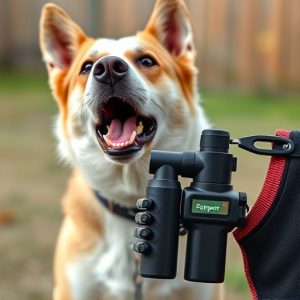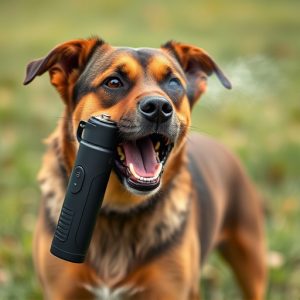Protecting Pets: Decontaminating After Pepper Spray Exposure
If your pet, especially a dog, is exposed to pepper spray (like Mace), immediate decontamination is…….
If your pet, especially a dog, is exposed to pepper spray (like Mace), immediate decontamination is vital. Remove contaminated clothing and thoroughly rinse fur, skin, and eyes with water or pet-safe solutions for at least 15 minutes. For internal exposure, seek veterinary attention as it can cause respiratory distress. Regularly clean bedding and toys to prevent further contamination. Use a 50/50 solution of warm water and white vinegar for a thorough neutralization. Ensure access to fresh water and follow up with proper obedience training and regular vaccinations for outdoor adventures, prioritizing your dog's safety and comfort.
Jogging with your dog is a great way to bond, but outdoor adventures may expose them to unexpected hazards, like pepper spray. Understanding the impact of pepper spray on pets and knowing how to decontaminate effectively is crucial for their safety. This article explores key aspects: from comprehending the effects of mace on animals to practical steps for decontaminating your pet after exposure. Learn how to prevent and mitigate risks, ensuring a safe and enjoyable experience for both you and your furry companion.
- Understanding Pepper Spray and Its Impact on Pets
- The Role of Decontamination in Pet Safety
- Effective Steps to Decontaminate Your Pet After Mace Exposure
- Preventive Measures: Ensuring Safe Outdoor Activities with Your Dog
Understanding Pepper Spray and Its Impact on Pets
Pepper spray, a popular self-defense tool for humans, contains capsaicin, a compound derived from chili peppers. When inhaled or sprayed into the eyes, it can cause temporary blindness and severe irritation. While not specifically designed for pets, pepper spray exposure isn’t harmless to animals either. If your jogging companion is exposed to pepper spray, quick action is crucial for their safety and well-being.
After decontaminating your pet as soon as possible, remove any contaminated clothing or bedding. Rinse the affected area with large amounts of water for at least 15 minutes. For eye exposure, flush gently using clean water or saline solution. Seek veterinary care if irritation persists or worsens. Remember, proper handling and storage of pepper spray around pets are essential to prevent accidental exposure.
The Role of Decontamination in Pet Safety
After a dog is exposed to pepper spray, decontaminating them becomes an essential step in ensuring their safety and well-being. Pepper spray, or oleoresin capsicum (OC), is a potent irritant that can cause severe discomfort and even panic in dogs. It’s crucial to quickly remove any visible pepper spray residue from the pet’s fur, skin, and eyes using water or decontaminating solutions recommended for OC exposure.
Proper decontamination involves rinsing the affected areas thoroughly and gently. For internal exposure, seeking veterinary care is vital as it can lead to respiratory distress or other health issues. Regularly washing your dog’s bedding and toys with hot water and soap also helps prevent further contamination and cross-infection within the household.
Effective Steps to Decontaminate Your Pet After Mace Exposure
After your protective dog has been exposed to pepper spray, it’s crucial to take immediate steps to decontaminate them. Start by removing any contaminated clothing or accessories and rinse their fur thoroughly with warm water using a mild, pet-safe shampoo. This helps wash away any residual chemicals. Gently wipe down their paws, legs, and face with a damp cloth, ensuring no spray residue remains.
Following this initial rinse, create a diluted solution of warm water and white vinegar (a 50/50 mix) and use it to thoroughly clean your pet’s coat and skin. The vinegar helps neutralise the pepper spray’s active ingredients. Rinse again with plain water to remove any vinegar residue. Finally, dry your dog gently with a clean towel and ensure they have access to fresh water to drink, helping flush out any remaining chemicals from their system.
Preventive Measures: Ensuring Safe Outdoor Activities with Your Dog
When it comes to outdoor adventures with your furry companion, safety should always be a top priority. While pepper spray can be an effective deterrent for potential threats, preventative measures are key to ensuring a safe and enjoyable experience for both you and your dog. Regular training sessions focused on obedience and recall commands are essential; a well-trained dog is more likely to stay by your side and respond appropriately in any situation.
Additionally, keeping your dog up-to-date with vaccinations and ensuring regular decontamination after outdoor activities is vital. This includes a thorough wash-down to remove any potential irritants or contaminants, especially if your dog has been exposed to mace or other chemicals. A quick decontaminate pet after Mace exposure can prevent skin irritation and discomfort for your canine partner, allowing you both to continue exploring the great outdoors with peace of mind.
Jogging with your dog is a great way to stay active, but it’s crucial to be prepared for unexpected encounters. Understanding how pepper spray can affect pets and knowing the essential steps to decontaminate your companion after potential exposure are vital components of responsible pet ownership. By following these guidelines and taking preventive measures, you can ensure safe outdoor adventures without compromising your dog’s well-being. Remember, being proactive in pet safety is a game-changer for both you and your four-legged friend.


